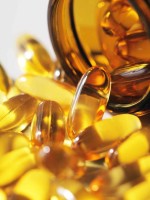Reducing angry behavior with vitamins?

Are children lacking the essential elements for a well nourished brain more susceptible to bad behavior?
A number of studies show a link between violent behavior in some individuals and their levels of DHA, an essential fatty acid. EFAs, or essential fatty acids are required by the brain in order for it to function well.
The body does not manufacture its own EFAs and so we have to obtain them from the outside, from what we eat. One type, ALA, alpha linolenic acid, comes from vegetable sources like flax seed and walnuts and some vegetable oils. The body only partially converts ALA into DHA and EPA. Fatty cold water fish provide a direct source of EPA and DHA, allowing more DHA to get into the body.
According to Dr. Frank Sacks, Professor of Cardiovascular Disease Prevention at Harvard University School of Public Health, Omega 3 fatty acids protect from heart attack and stroke as well as against autoimmune disorders and in building the membranes of brain cells.
The ratio of EFA choices is important
The EFA that most Americans get a lot of is Omega – 6. It comes from animal (meat) sources. Compared to our ancestors, we are getting between 16 times more Omega -6 for each serving of Omega-3 than we did before the last 50 years or before we began eating so much processed food. We are getting far less DHA or Omega- 3 that comes from fish oil or krill( non-fish plankton) oil sources. It is the ratio of Omega- 3 to Omega – 6 levels that are important as well as the need to eat a moderate amount of each. A diet of 4 servings of Omega 3s to one serving of Omega 6 is considered ideal. So one would have 3 servings of cold water fish, and 2 or 3 servings of walnuts, flax seeds (1 or 2 tablespoons) or cold pressed organic vegetable oil each week. (See the Food section in the coming months for some super good ways to meet these brain needs.)
Low DHA levels were found in boys with impulsive behavior and later alcohol dependency
In observational studies done by Hibbeln et al. 1998a, 1998b it was suggested that low plasma DHA levels may increase the predisposition of some people to impulsive or violent behavior. This was seen especially in boys who become alcohol dependent before the age of 20. This suggest that they are probably attempting to self medicate with alcohol.
Raising DHA reduced stress levels
In another study done by Hamazaki et al. 1996, students taking DHA during periods of academic stress did not show the same rise in aggressive behavior exhibited by their peers who did not take DHA. This indicates that supplementing what the brain is missing to function normally and activate self control allows the body to calm itself naturally. Supplementation with omega-3 EFAs, vitamins and minerals were found to reduce violent behavior in prison populations by an average of 35% (Gesch et al. 2002). The results of this study and others which achieved similar results implies readily available solutions for communities where nutritional needs are not met and child behavior and learning are below potential.
High meat intake associated with violent behavior
A diet high in meat may cause an imbalance of essential fatty acids which are essential to brain health. Low levels of essential fatty acids (EFAs) are associated with a number of brain health problems such as depression, anxiety, dementia, multiple sclerosis (MS) and ADHD. In children low DHA levels are associated with ADD, ADHD, behavior problems, sleep problems and distractibility. We can improve behavior and learning by supplementing our children’s diets with a high quality fish oil (wild arctic salmon or cod) supplement.
In supplementing with fish oils, care should be taken to obtain the highest quality fish oil supplement by looking for those that are free of toxins and made from wild caught Arctic fish. (See VitalChoice.org for more info or see our FooD section in the coming weeks.)
